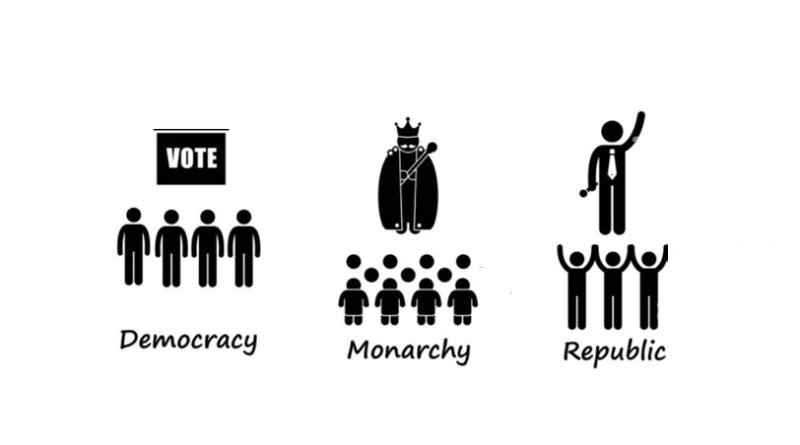Republic vs Democracy vs Monarchy: A Simple Comparison
Throughout history, societies have developed various systems of government to manage their people and resources. Three of the most discussed forms of government are republics, democracies, and monarchies. Each has its unique features, advantages, and disadvantages. Let’s dive into these systems in simple terms.
What is a Republic?
A republic is a form of government where the power lies with the people and their elected representatives. In most republics, there is a constitution that outlines how the country is governed. The head of state in a republic is often an elected president, rather than a monarch.
Key Features of a Republic:
- Elected Leaders: Leaders are chosen by the people through elections.
- Rule of Law: Everyone, including leaders, must follow the law.
- Constitution: A written document guides how the government works.
Examples of Republics:
- India
- The United States
- France
Advantages of a Republic:
- People have a say in choosing their leaders.
- Laws apply equally to everyone.
- It promotes accountability.
Disadvantages of a Republic:
- Elections can be expensive and time-consuming.
- Leaders may make decisions that do not always please everyone.
What is a Democracy?
A democracy is a system of government where power lies directly with the people. The word “democracy” comes from the Greek words “demos” (people) and “kratos” (power). In a democracy, decisions are often made based on majority rule.
Types of Democracy:
- Direct Democracy: People vote directly on laws and decisions. Example: Ancient Athens.
- Representative Democracy: People elect representatives to make decisions on their behalf. Example: Most modern democracies like Canada and Australia.
Key Features of a Democracy:
- Participation: Citizens have the right to vote and express their opinions.
- Majority Rule: Decisions are made based on what most people want.
- Freedom: Citizens enjoy rights like free speech, religion, and assembly.
Examples of Democracies:
- Norway
- Germany
- Japan
Advantages of a Democracy:
- People’s voices are heard.
- It allows for changes in leadership through elections.
- Protects individual freedoms and rights.
Disadvantages of a Democracy:
- Decision-making can be slow due to debates and voting.
- Majority rule can sometimes ignore minority rights.
What is a Monarchy?
A monarchy is a system of government where a single person, known as a monarch, rules the country. Monarchs often inherit their position through family lines, such as kings, queens, or emperors. Monarchies can be either absolute or constitutional.
Types of Monarchy:
- Absolute Monarchy: The monarch has complete control over the government and makes all decisions. Example: Saudi Arabia.
- Constitutional Monarchy: The monarch’s power is limited by a constitution, and elected officials run the government. Example: The United Kingdom.
Key Features of a Monarchy:
- Hereditary Rule: Leadership is passed down through families.
- Long-Term Stability: Monarchs often rule for life.
- Tradition: Monarchies are often rooted in centuries-old customs.
Examples of Monarchies:
- United Kingdom (Constitutional Monarchy)
- Saudi Arabia (Absolute Monarchy)
- Japan (Ceremonial Monarchy)
Advantages of a Monarchy:
- Provides long-term stability and continuity.
- Decisions can be made quickly in absolute monarchies.
- Symbolizes national unity and tradition.
Disadvantages of a Monarchy:
- People have little or no say in choosing their leader.
- Absolute power can lead to misuse or oppression.
- It may not reflect modern democratic values.
Comparing Republic, Democracy, and Monarchy
| Feature | Republic | Democracy | Monarchy |
|---|---|---|---|
| Leader | Elected President | Elected Representatives | Monarch (King/Queen) |
| Power Source | The People and Constitution | The People | Family Lineage (Hereditary) |
| Decision-Making | By Representatives or Laws | By Majority Rule | By Monarch |
| Examples | India, USA, France | Norway, Germany, Japan | UK, Saudi Arabia, Japan |
| Key Advantage | Accountability and Equality | People’s Voice Matters | Stability and Tradition |
| Key Disadvantage | Costly Elections | Slow Decision-Making | Lack of Choice in Leadership |
Conclusion
Each system of government has its strengths and weaknesses. A republic emphasizes laws and accountability, a democracy ensures people’s voices are heard, and a monarchy offers stability and tradition. The best system depends on the values and needs of a society. By understanding these systems, we can appreciate how different countries are governed and what makes each unique.

